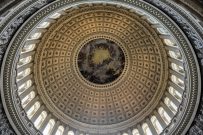Greg Weiner responds to Stephen Knott and George Thomas
Don’t miss Greg Weiner’s reply in the Liberty Forum section to separate responses by Stephen Knott and George Thomas to his essay, “Congress and Deliberation in the Age of Woodrow Wilson: An Elegy”.
Herewith, an excerpt:
[F]or every instance of presidents acting alone, one can offer others of presidents acting in consultation with Congress according to the constitutional model. James K. Polk lined up troops on the Mexican border, observed that a state of war already existed, but nonetheless asked Congress for a declaration. Lincoln, so beloved of devotees of Presidential prerogative, repeatedly asked Congress to ratify what he had extra-constitutionally done. Perhaps some of the excesses attributed to President Bush were not unprecedented, as Steve notes in his book, even though I would argue the difference lies in reclassifying them as rules rather than as exceptions. In either case, the fact that other presidents engaged in similar practices does not seem to me to be a defense of them. On the whole, the examples Steve provides do not constitute either the sole historical pattern or, crucially, an argument that presidents properly act unilaterally in these ways.
Next, some of Knott’s illustrations seem more complicated than his presentation here. Yes, Washington issued a Neutrality Proclamation, but this was hardly an uncontroversial constitutional act. Moreover, when juries rejected his Administration’s attempt to try people for violating it, he was compelled to go to Congress for legislative authority to back it up. Similarly, a miffed Washington did indeed refuse ever to return to the Senate for advice and consent in person after doing so on the Indian treaty, but this was because the Senate—which then had constitutional kishkes—irritated him by refusing merely to accede quickly to his wishes. Washington reasonably withheld documents pertaining to the negotiation of the Jay Treaty; it is far more difficult to see him simply circumventing the Senate by reclassifying it as an “executive agreement,” as for example, President Bush did in concluding an agreement with the government of Iraq.
Throughout Knott’s analysis, it seems to me there is a danger—see Burke on this point—of mistaking exceptions for rules. Jefferson intended the Louisiana Purchase to be the former—a big exception, to be sure, historic in scope, but one committed over grave constitutional reservations, surely not intended to set a precedent.


